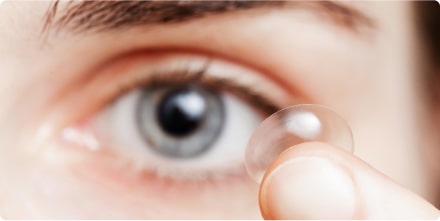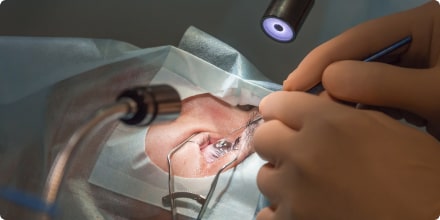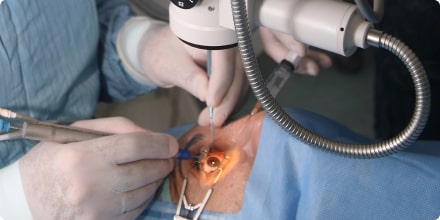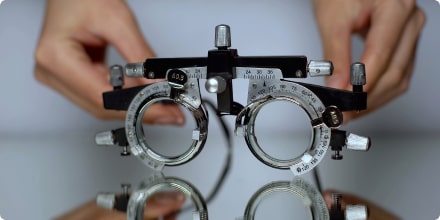Table of content

What is Refractive Error?
Refractive errors such as myopia, hyperopia, and astigmatism are common vision problems where the eye struggles to focus light properly onto the retina, leading to blurry vision. With myopia, distant objects appear blurry, while with hyperopia, close-up objects may be difficult to see clearly. Astigmatism causes overall blurry vision due to irregularities in the shape of the eye’s surface.
Symptoms
Corneal diseases may manifest gradually, often without noticeable symptoms in the early stages. However, as the condition advances, individuals experience the following:

- Blurry or distorted vision
- Eye pain or discomfort
- Redness or inflammation
- Sensitivity to light (photophobia)
- Excessive tearing or dryness
- Foreign body sensation or gritty feeling in the eye
Causes
Corneal diseases can stem from factors like infections, injuries, underlying medical conditions, and genetic predispositions. These conditions may disrupt the normal structure and function of the cornea, leading to corneal abnormalities and diseases. Additionally, environmental factors such as prolonged exposure to ultraviolet (UV) radiation or allergens can also contribute to the development of corneal disorders.
Types
There are different types of corneal diseases, including:
Myopia (shortsightedness)
This occurs when the eyes are misaligned, leading the brain to ignore the image from one eye to prevent double vision.
Refractive Amblyopia
This form arises from significant differences in vision between the eyes, causing the brain to prefer the clearer eye for visual processing.
Deprivation Amblyopia
Caused by visual blockages like cataracts, this type hinders normal visual development in one eye by preventing clear visual input.
Presbyopia
Age-related decline in near vision due to decreased flexibility of the eye’s lens, making close-up tasks challenging.
Risk Factors
Factors that may increase the risk of developing corneal diseases include:

- Poor eye hygiene or contact lens care
- Weakened immune system
- Previous eye surgeries or injuries
- Genetic predisposition to corneal disorders
- Chronic eye conditions like dry eye syndrome
- Exposure to environmental hazards or allergens
How to prevent
Preventive measures to reduce the risk of corneal diseases include:
Practising good eye hygiene and proper contact lens care
Avoiding eye injuries by using protective eyewear during activities
Prompt treatment of eye infections or injuries
Regular eye exams to detect and address any corneal abnormalities
Protecting the eyes from harmful UV radiation and environmental irritants
Types of Treatments
The treatments for refractive errors vary depending on the specific condition. Here are the types of treatments for different refractive errors:

Contact lenses are available for correcting all three refractive errors - astigmatism, hyperopia, and myopia

Laser surgery procedures can be used to reshape the cornea, which also provides a long-term solution for those seeking freedom from glasses or contact lenses

Surgical implantation of Phakic Intra Ocular Lenses in front of or behind the iris for improved vision

Surgical removal of the Eye's Natural Lens with Refractive Lensectomy and replacement with an Artificial Lens

Toric Eyeglasses with special lenses that correct both astigmatism and other refractive errors

LASIK is also recommended as a safe and permanent treatment for myopia
Regular follow-up appointments are essential for monitoring progress, evaluating the effectiveness of treatment, and making any necessary adjustments.
Table of content
Book an appointment
Informative and Comprehensive
Frequently Asked Questions
Common queries about the treatment are addressed in this section. Find your answers here.
How do i schedule an appointment?
You can schedule an appointment by calling our hospital directly, filling out our online appointment request form or visit our hospital in person. Our staff will assist you in finding a convenient appointment time.
How long is the recovery period after eye surgery?
Recovery time can vary depends upon the types of surgery performed and individual factors. Generally, most patients experience significant improvement within few days or weeks following surgery.
Do you accept insurance plans?
Yes, we accept insurance plans and we aslo accept flexible payment options for patients without insurance coverage. you can visit our website for more details and can contact our billing department for specific insurance-related inquiries.
What are the common eye conditions treated at your hospital?
We specialise in treating a wide range of eye conditions, including cataract, glaucome, macular degeneration, diabetic retinopathy, and refractive errors such as myopia and hypermetropia and astigmatism.
What measures do you take to ensure patient safety during eye surgeries?
We follow strict surgical protocols and maintain a sterile environment in our surgical facilities to minimize the risk of infection and ensure the safety of our patients during eye surgery.
Do you offer pediatric eye care services?
Yes, we provide specialised pediatric eye care services, including comprehensive eye care examination, vision screenings, and treatment of common childhood eye conditions.